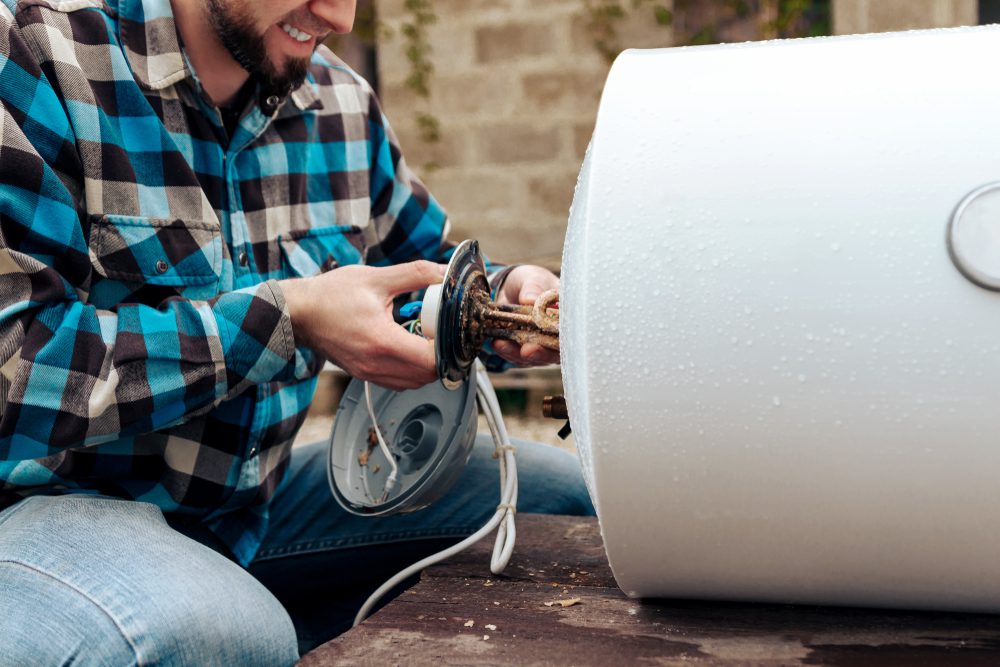Coping with the Most Frequent Hot Water Heater Emergencies
Coping with the Most Frequent Hot Water Heater Emergencies
Blog Article
We have stumbled on the article involving Warning Signs You Need Water Heater Repairs directly below on the net and thought it made perfect sense to discuss it with you here.

A water heater is just one of the most important standard appliances that can be located in a home. With water heaters, you don't require to undergo the stress of home heating water manually every time there is a demand to wash, do the laundry, or the recipes. There is always an opportunity that your water heater would certainly act up as with most mechanical gadgets.
It is necessary to note any kind of little malfunction as well as tackle it quickly prior to things get out of hand. The majority of times, your water heater starts to malfunction when there is a build-up of debris as a result of continuous usage. As a precaution, regular flushing of your hot water heater is recommended to avoid debris buildup as well as protect against functional failure.
Typical hot water heater emergency situations and exactly how to manage them
Too little hot water
It may be that the water heater can not support the hot water need for your home. You might upgrade your water heating system to one with a larger capacity.
Rising and fall water temperature.
Your hot water heater could begin creating water of various temperatures normally ice hot or cool warm. In this circumstance, the first thing you do is to guarantee that the temperature level is readied to the desired level. If after doing this, the water temperature level maintains changing throughout showers or various other tasks, you may have a malfunctioning thermostat. There might be a demand to replace either the home heating or the thermostat device of your hot water heater.
Dripping hot water heater storage tank.
In this circumstance, you must transform off your water heating unit, enable it to cool down, as well as very carefully look for the resource of the issue. At times, all you require to do is to tighten a few screws or pipeline connections in situations of minor leaks. If this does not function as well as the leakage continues, you might need to use the solutions of a specialist for a suitable substitute.
Blemished or odiferous water
When this takes place, you need to know if the problem is from the tank or the water source. If there is no amusing scent when you run cold water, after that you are certain that it is your water heating system that is faulty. The smelly water can be caused by rust or the accumulation of germs or debris in the water heater storage tank.
Final thought
Some house owners ignore little caution as well as minor faults in their water heater device. This only brings about additional damage as well as a possible total breakdown of your appliance. You must deal with your hot water heater mistakes as soon as they come near avoid more expenditures and unneeded emergency troubles.
With water heating units, you don't need to go via the tension of heating water by hand every time there is a need to take a bath, do the washing, or the meals. It may be that the water heating system can not support the hot water need for your house. Your water heating system might begin creating water of different temperature levels usually ice cool or scalding hot. If there is no amusing smell when you run chilly water, then you are specific that it is your water heater that is malfunctioning. The stinky water can be triggered by corrosion or the buildup of bacteria or sediments in the water heating system tank.
Common Water Heater Issues and What You Should Do
What Type of Water Heater Do You Have?
Before we begin it’s first important that you identify the type of water heater you have on your property. There are two main types of water heaters out there: conventional and high efficiency.
Both of these types of products typically use either gas or electricity to heat power. There are also solar water heaters that use a thermal collector on the roof or yard to heat the water.
While these models are not as common, they can cut heating costs in half. In this article, we will focus on conventional and high efficiency.
How Do My Electric and Gas Water Heater Work?
Though they look similar, electric and gas water heaters work very differently. It’s important to know their basic function because often problems can be specific to the heating source.
In the electric model, a thermostat on the side of the machine detects the temperature of the water in the tank. When the temperature needs to rise electricity flows to a heating element suspended in the water.
Gas models also use a thermostat device — typically with a mercury sensor at the tip and an additional sensor called a thermocouple. The thermocouple detects whether the pilot light is on and controls the flow of gas.
When the thermostat drops below the appropriate level gas is released which becomes ignited by the pilot light. The flame heats the bottom of the water tank which causes hot water to rise and cold water to drop.
This natural circulation continues until the water reaches the desired temperature. Then, the thermostat triggers the gas control valve to shut off the flow of gas.
What Are the Most Common Issues and How Do You Fix Them?
https://happyhiller.com/blog/common-water-heater-issues-and-what-you-should-do/

Do you really like reading about Is Your Water Heater Leaking?? Post feedback down the page. We'd be interested to know your suggestions about this review. Hoping to see you back again later on. Remember to take the opportunity to promote this entry if you enjoyed it. Many thanks for your time. Visit us again soon.
Act, don't delay! Report this page